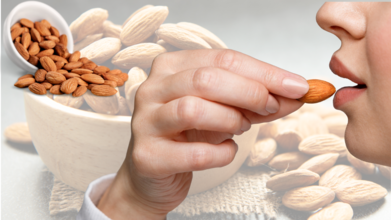- Health Conditions A-Z
- Health & Wellness
- Nutrition
- Fitness
- Health News
- Ayurveda
- Videos
- Medicine A-Z
- Parenting
- Web Stories
International Coffee Day 2024: 5 Health Benefits Of Coffee You Didn't Know

Credits: Canva
Happy International Coffee Day! It’s no secret that coffee is a beloved beverage worldwide, but beyond its delicious taste and energizing effect, coffee also offers some notable health benefits. Today, we’ll explore five of those benefits, backed by studies to show just how coffee can positively impact your health.
Boosts Energy and Enhances Athletic Performance
One of the most well-known benefits of coffee is its ability to increase energy levels. Coffee contains caffeine, a natural stimulant that works by blocking adenosine, a neurotransmitter that makes you feel sleepy. By doing this, caffeine increases the levels of dopamine and other neurotransmitters that help improve your energy and alertness.
A study in 126 older adults found that drinking coffee was associated with improved physical performance and faster gait speed
But the magic doesn’t stop there—caffeine is also popular among athletes. It acts as an ergogenic aid, meaning it can enhance physical performance. One review of nine studies showed that drinking coffee before exercise not only improved endurance but also reduced the perceived effort during workouts, making the activity feel less challenging . Another study found that coffee can even improve physical performance in older adults, helping them move faster and with more energy . So, whether you’re gearing up for a workout or need an energy boost, your morning coffee could be the perfect ally.
Supports Brain Health and Protects Against Diseases
Coffee does more than just perk you up—it might protect your brain, too. Studies suggest that regular coffee drinkers are at a lower risk of developing neurodegenerative diseases like Alzheimer’s and Parkinson’s. But how does it work?
Researchers believe the caffeine and antioxidants in coffee play a role in protecting brain cells from damage over time. A review of 13 studies found that people who consumed caffeine regularly had a significantly lower risk of developing Parkinson’s disease. Even more impressive, the same study showed that caffeine might slow the progression of Parkinson’s in people who already have the condition . Another review involving over 29,000 people revealed that regular coffee drinkers had a reduced risk of developing Alzheimer’s disease . So, sipping on coffee isn’t just keeping you alert—it could also be helping preserve your brain’s long-term health.
May Aid in Weight Management
If you’re trying to manage your weight, coffee might give you an edge. Studies have shown that coffee affects how your body stores fat and even supports gut health, both of which play important roles in weight management.
One study reviewing 12 studies found that people who drank more coffee tended to have less body fat, particularly in men . The reason behind this? Coffee contains compounds that may help promote fat breakdown and reduce fat accumulation. Additionally, coffee seems to encourage physical activity—another important factor for weight management. According to one study, people who consumed one to two cups of coffee per day were 17% more likely to meet recommended levels of physical activity, compared to those who drank less than one cup daily . This means that coffee could motivate you to stay active, which is essential for maintaining a healthy weight.
Lowers the Risk of Type 2 Diabetes
Coffee has also been linked to a reduced risk of type 2 diabetes, a condition that affects how your body regulates blood sugar. The connection between coffee and diabetes prevention has been studied extensively, with promising results.
One large review of 30 studies concluded that for every cup of coffee consumed daily, the risk of developing type 2 diabetes dropped by 6% . How does this happen? Coffee is believed to help protect the beta cells in the pancreas, which are responsible for producing insulin—the hormone that regulates blood sugar levels. Additionally, coffee is rich in antioxidants, which may improve insulin sensitivity and reduce inflammation, both of which are key factors in the development of type 2 diabetes. So, your daily coffee habit might be doing more than just satisfying your taste buds—it could be keeping your blood sugar in check, too.
Lifts Your Mood and Lowers the Risk of Depression
Feeling a bit low? Coffee might help with that too! Several studies have found that coffee drinkers have a lower risk of depression. But how does it actually affect your mood?
Caffeine stimulates the production of certain neurotransmitters, including serotonin and dopamine, which are often referred to as the brain’s "feel-good" chemicals. In a review of seven studies, researchers found that each cup of coffee consumed daily was linked to an 8% lower risk of depression . Another study showed that drinking at least four cups of coffee per day was associated with a significantly reduced risk of depression compared to drinking only one cup per day . Additionally, coffee has been linked to a lower risk of suicide, possibly due to its positive effects on mood and mental health. So, if you’re feeling down, your cup of coffee might give your mood a much-needed boost.
How 60 Grams of Almonds Daily Protects DNA and Beats Stress: Study

Credits: Canva
For many, almonds are just that 4 pm snack when the stomach growls. But according to recent research published in The Journal of Nutrition, eating over 60 grams of almonds every day does a lot more than kill hunger pangs. It can actually protect your DNA and reduce oxidative stress, one of the invisible troublemakers behind ageing, inflammation, and disease.
The science behind almond power
Oxidative stress sounds complicated, but it is essentially what happens when your body is flooded with harmful free radicals, unstable molecules that damage cells and speed up ageing. Over time, this silent chaos chips away at your health, increasing your risk of chronic illnesses.
These nutrient-dense seeds are loaded with vitamin E, healthy fats, flavonoids, and antioxidants. Together, they form a cellular defence squad, fighting off free radicals and keeping your DNA intact.
As the study explains, people who ate over 60 grams of almonds daily experienced significant improvements in antioxidant status. This reduced key biomarkers of oxidative stress, which directly translated into healthier DNA and better-protected cells.
Building on earlier research
This is not the first time almonds have flexed their protective powers. A landmark randomised controlled trial tested 84 grams of almonds daily in young male smokers—arguably one of the toughest environments for oxidative damage. The results were striking: oxidative DNA damage dropped by about 28 per cent, lipid peroxidation (fat damage in the body) fell by 34 per cent, and DNA strand breaks decreased by 23 per cent. Even more impressively, antioxidant enzyme activity improved.
In other words, almonds worked even when the odds were stacked against them, laying the groundwork for current findings. The latest study reinforces that almonds are not just heart-healthy; they may actually slow down cellular wear and tear.
Why 60 grams daily is the magic number
You have probably heard health gurus praise almonds for brain function and heart protection, but this study sets a new benchmark. Sixty grams is not just a casual handful tossed into a trail mix. We are talking about 40 to 45 whole almonds, a deliberate daily serving.
At this intake, almonds hit what researchers call a “protective threshold”. The bioactive compounds reach levels strong enough to reduce DNA damage, combat lipid peroxidation, and boost antioxidant defences. Eating fewer almonds still has benefits, but the full protective effect seems to kick in once you cross that 60-gram line.
How to include 60 grams into your day
Sixty grams is roughly two servings, and with a little creativity, you can spread them throughout your day without it feeling like a chore.
- Snack smart: Keep a small container of raw or roasted almonds at your desk for mid-morning or late-afternoon cravings.
- Smoothie upgrade: Blend a handful of almonds or a spoonful of almond butter into your morning smoothie for creaminess and a nutrient boost.
- Breakfast crunch: Sprinkle chopped almonds over oatmeal, yoghurt, or cereal bowls.
- Lunch and dinner twist: Add slivered almonds to salads, curries, or stir-fries for crunch and texture.
- Spread the love: Swap your usual toast topping for almond butter, or use it as a dip with apple slices.
- Nutty mixes: Combine almonds with walnuts, cashews, and pumpkin seeds for a satisfying trail mix.
Beyond DNA: the bigger almond picture
Protecting your DNA might sound like something out of a sci-fi novel, but it is central to long-term health. When your cells are safeguarded from oxidative stress, your immune system works better, ageing slows down, and inflammation is kept in check. That means fewer wrinkles, stronger defences against disease, and an overall boost in energy and wellbeing.
And let us not forget the classic almond benefits: better heart health, improved cholesterol levels, enhanced brain function, and more stable blood sugar.
How Much Protein Is Too Much Protein?

Credits: Canva
Protein has earned a reputation as the building block of life, and for good reason. As one of the three essential macronutrients, alongside carbohydrates and fats, it plays a critical role in keeping your body functioning. From oxygen transport and immune defense to nerve signaling and tissue growth, protein is involved in nearly every system in your body.
But while it’s clear that protein is important, a question often comes up: Can you have too much of it? Let’s break down what the science says about protein requirements, and whether eating more than your daily share poses real risks.
How Much Protein Do You Really Need?
Your protein needs aren’t one-size-fits-all. They depend on several factors: your weight, age, physical activity, body composition goals, and overall health status.
The Recommended Dietary Allowance (RDA) for the average adult is 0.36 grams per pound (0.8 grams per kilogram) of body weight. This amount is generally enough to meet basic nutritional needs for most sedentary adults.
However, experts suggest that people who are physically active often need more, anywhere from 0.54 to 0.9 grams per pound (1.2–2 grams per kilogram) per day. Athletes may even require higher amounts to support muscle repair and performance.
Certain groups, such as pregnant or breastfeeding individuals, older adults, and people recovering from illness or injury, also have increased protein needs. For example, during pregnancy, the recommendation rises to about 0.5 grams per pound (1.1 grams per kilogram).
Are High-Protein Diets Harmful?
For years, concerns have circulated about the safety of high-protein diets, particularly regarding their potential impact on the kidneys, heart, and bones. But research suggests that many of these fears are unfounded — at least for healthy individuals.
Heart Health
Some worry that consuming too much protein, especially from animal sources, might raise the risk of heart disease. However, large-scale studies have not found a consistent link. One study involving over 12,000 adults found no association between animal or plant protein intake and heart disease risk. Similarly, reviews in 2020 and 2023 concluded that high protein intake was not connected to increased risks of stroke, cardiovascular death, or other heart-related conditions.
Bone Health
Earlier research hinted that high-protein diets might weaken bones by increasing calcium loss. Yet more recent evidence shows the opposite. A 2019 review of 13 studies found that higher protein intake — above the current RDA, was linked to stronger bones and a reduced risk of hip fractures. Since protein makes up over one-third of bone mass, adequate intake, alongside calcium and vitamin D, supports skeletal health.
If you’re thinking about ramping up your protein intake, the key is balance and individualization. While high-protein diets appear safe for most healthy people, your exact needs depend on your lifestyle, age, and health conditions.
Working with a registered dietitian or qualified healthcare provider can help you find the right amount for your body while ensuring your diet stays balanced with other nutrients. After all, protein is powerful, but it works best as part of a well-rounded eating plan.
Celebrity Nutritionist Shares 5 Signs Of Poor Diet

Credits: Canva
If you think “healthy eating” is just about protein shakes, cutting carbs, and stocking your fridge with probiotic shots, celebrity nutritionist Rujuta Diwekar wants to have a word with you. Known for guiding Bollywood’s biggest names, including Kareena Kapoor, Rujuta is famous for her practical, grandma-approved advice. In her August 11 Instagram post, she listed five signs your diet is not only unsustainable but also joyless. And her antidote is simple: good old home-cooked food.
1. Protein Overload
While protein is important, your diet should not look like a bodybuilding competition menu. You might do more harm than good. Rujuta warns that loading up on a single nutrient creates imbalance both on your plate and in your gut. If dal, sabzi, roti, and a bit of rice have been replaced with chicken breasts and protein bars, you are not nourishing yourself; you are overdoing it.
2. No Spice, No Fun
Somewhere along the way, you ditched your daily pickle, chutney, or masala because someone on the internet said, “Seasonings cause water retention.” Now, your evenings are spent rummaging through cupboards looking for anything salty, spicy, or sweet to kill the craving. Rujuta’s point is that flavour is not the enemy. A little tadka in your dal or a sprinkle of chaat masala on your salad can actually make your meals more satisfying and keep late-night snack attacks at bay.
3. Portion Panic
You start cutting back on roti. Then you take only half a spoon of rice. Next thing you know, you are eying your own fruit bowl suspiciously. This “portion paranoia” often does the opposite of what you intended: it strips meals of comfort and turns eating into a stress sport. Rujuta reminds us that eating enough is essential, not indulgent. Confidence does not come from calorie counting; it comes from nourishing your body so it works with you, not against you.
4. Festivals Feel Like Cheating
If modak during Ganpati, sheer korma on Eid, or Christmas cake feels like a guilty transgression, your diet is robbing you of more than calories; it is stealing your joy. Food is culture, connection, and celebration. The minute your “diet plan” turns family gatherings into anxiety traps, it is no longer healthy. Rujuta says that food is culture, community, and cuisine. It is a wholesome way to live.
5. Gut Health Overload
Once upon a time, a happy stomach meant you ate on time and enjoyed your meals. Now, you have got a probiotic drink, a prebiotic pill, and some digestive tonic, yet your gut feels perpetually off.Ironically, over-focusing on “gut health” can stress your digestive system further. Sometimes, what your stomach really needs is not a lab-formulated elixir but a home-cooked khichdi and curd.
Why Home-Cooked Food Wins Every Time
Rujuta’s core philosophy is deceptively simple: eat what you can make at home, using local, seasonal ingredients, without obsessing over macros and metrics.Why? Because home-cooked food naturally ticks all the boxes; it is balanced, economical, and emotionally grounding. It does not just help you lose weight; it helps you stop making weight loss the centre of your life.
A plate of fresh roti, ghee-topped dal, sabzi, and a little pickle is not just dinner; it is tradition, nutrition, and comfort, all in one. Plus, it is far cheaper than imported almond flour or cold-pressed mushroom juice.
Rujuta’s five red flags are a reminder that eating well should add to your life, not shrink it down to a list of forbidden foods.
© 2024 Bennett, Coleman & Company Limited

